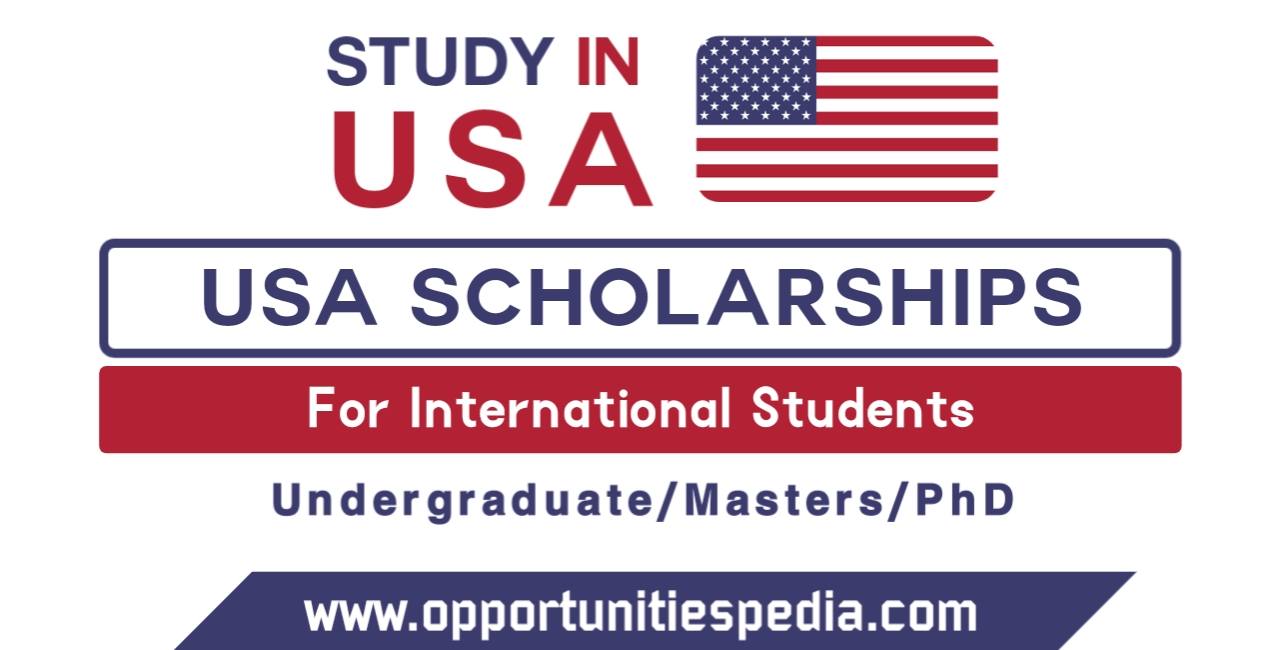Undergraduate scholarships for international students provide financial support to study abroad. These scholarships aim to promote diversity and educational access.
International students face numerous challenges when pursuing higher education abroad, including financial barriers. Scholarships play a vital role in easing these burdens. Many institutions and organizations offer various scholarships, targeting students from different countries and backgrounds. These opportunities can cover tuition fees, living expenses, and other academic costs.
By applying for these scholarships, students can focus on their studies and enrich their cultural experiences. Researching available scholarships early enhances the chances of securing funding. Prospective students should explore options that align with their academic goals and financial needs to maximize their opportunities.
Undergraduate Scholarships For International Students

Table of Contents
Types Of Scholarships
Undergraduate scholarships for international students come in various types. Understanding the different categories can help students find the right financial support. Scholarships can ease financial burdens and provide access to quality education. Here, we explore three main types: merit-based, need-based, and sports scholarships.
Merit-based
Merit-based scholarships reward students for their academic achievements and talents. These scholarships are highly competitive. They often consider grades, test scores, and extracurricular activities. Universities use these criteria to identify top performers.
Common features of merit-based scholarships include:
- High academic performance
- Standardized test scores
- Leadership roles in clubs or organizations
- Unique talents, such as art or music
Some universities offer specific merit-based scholarships. Here’s a table of a few examples:
| University | Scholarship Name | Eligibility Criteria |
|---|---|---|
| Harvard University | Harvard International Scholarship | Top 10% of applicants |
| Stanford University | Stanford Merit Award | GPA above 3.75 |
| University of Chicago | Chicago Academic Excellence Scholarship | High SAT/ACT scores |
These scholarships not only provide funds but also enhance a student’s resume. They demonstrate dedication and hard work.
Need-based
Need-based scholarships help students who require financial assistance. These scholarships consider the student’s financial situation. They aim to support those who might struggle to afford tuition and living costs.
Factors considered for need-based scholarships include:
- Family income
- Number of dependents
- Cost of living in the university city
Many universities have programs for need-based aid. Below is a list of some popular ones:
- Federal Pell Grant
- University Grants
- State Grants
Applying for need-based scholarships usually requires financial documents. Students may need to fill out forms like the FAFSA. These scholarships relieve stress and allow students to focus on their studies.
Sports Scholarships
Sports scholarships support athletes who excel in their sport. These scholarships encourage talented individuals to pursue education while playing at a high level. Universities recognize the value of sports in promoting school spirit and teamwork.
Eligibility for sports scholarships typically includes:
- Outstanding athletic performance
- Participation in competitions
- Coaches’ recommendations
Many colleges offer sports scholarships in various disciplines. Here’s a brief overview of popular sports scholarship programs:
| University | Sport | Scholarship Amount |
|---|---|---|
| University of Florida | Football | $20,000 |
| University of Southern California | Basketball | $15,000 |
| Stanford University | Swimming | $25,000 |
Sports scholarships often cover tuition, fees, and even living expenses. They allow student-athletes to balance their academic and athletic careers effectively.

Popular Destinations
Undergraduate scholarships for international students open doors to quality education worldwide. Many students choose popular destinations like the United States, the United Kingdom, and Australia. Each of these countries offers unique opportunities and scholarships to support international students.
United States
The United States is a top choice for international students. It boasts world-class universities and diverse cultures. Scholarships in the U.S. often cover tuition, living expenses, and travel costs. Here are some prominent scholarship options:
- Fulbright Program: Offers funding for international students.
- International Student Scholarships: Available at various universities.
- Merit-Based Scholarships: Based on academic achievements.
Many universities provide their own scholarships. Here’s a quick look at a few:
| University | Scholarship Name | Amount |
|---|---|---|
| Harvard University | Harvard International Scholarship | Varies |
| Stanford University | Stanford International Scholarships | Varies |
| University of Chicago | Chicago Global Leaders Scholarship | Up to $20,000 |
Applying for scholarships in the U.S. requires strong academic records. Students must also demonstrate leadership skills and community involvement.
United Kingdom
The United Kingdom is another popular destination for international students. Renowned for its rich history and top universities, the UK offers various scholarships. These scholarships often focus on academic excellence and financial need.
- Chevening Scholarships: Funded by the UK government for postgraduate students.
- Commonwealth Scholarships: For students from low and middle-income countries.
- University-Specific Scholarships: Offered by individual universities.
Here are a few notable scholarships:
| University | Scholarship Name | Amount |
|---|---|---|
| University of Oxford | Rhodes Scholarship | Fully funded |
| University of Cambridge | Gates Cambridge Scholarship | Fully funded |
| University College London | UCL Global Undergraduate Scholarship | Up to £15,000 |
Students need strong grades and references. They should also show commitment to their field of study.
Australia
Australia attracts many international students each year. It is known for its friendly environment and high-quality education. Scholarships in Australia often help with tuition and living costs.
- Australia Awards: Provided by the Australian government for students from developing countries.
- Endeavour Postgraduate Scholarships: Support for international students pursuing postgraduate studies.
- University-Specific Scholarships: Offered by various Australian universities.
Here’s a glimpse of some scholarships:
| University | Scholarship Name | Amount |
|---|---|---|
| Australian National University | ANU Global Diversity Scholarship | Up to AUD 25,000 |
| University of Melbourne | Melbourne International Undergraduate Scholarship | Up to AUD 56,000 |
| University of Sydney | International Scholarship | Varies |
To apply, students need a good academic record. They should also show interest in community service and leadership.
Eligibility Criteria
Undergraduate scholarships for international students offer a chance to study abroad. These scholarships help students from different countries achieve their dreams. However, each scholarship has specific eligibility criteria. Understanding these criteria is crucial for success.
Academic Performance
Academic performance plays a vital role in scholarship eligibility. Most scholarships require a minimum GPA. This shows that students can handle the academic workload. Schools often look for students with strong grades in core subjects.
Here are some common academic requirements:
- A minimum GPA of 3.0 on a 4.0 scale.
- High scores in standardized tests like SAT or ACT.
- Strong performance in relevant subjects.
Some scholarships may also require:
| Scholarship Type | Required GPA | Test Scores |
|---|---|---|
| Merit-based | 3.5+ | SAT 1200+ |
| Need-based | 3.0+ | None |
| Field-specific | 3.2+ | ACT 25+ |
Students should maintain strong grades. This increases their chances of receiving scholarships.
Language Proficiency
Language proficiency is crucial for international students. Most universities require proof of English skills. Students must demonstrate their ability to succeed in an English-speaking environment.
Common tests to prove language proficiency include:
- TOEFL (Test of English as a Foreign Language)
- IELTS (International English Language Testing System)
- Duolingo English Test
Here are typical score requirements:
| Test | Minimum Score |
|---|---|
| TOEFL | 80 |
| IELTS | 6.5 |
| Duolingo | 105 |
Good scores in these tests show readiness for academic challenges. Students should prepare well to meet these requirements.
Age Limit
Age limits can vary for different scholarships. Some scholarships target specific age groups. Many programs prefer younger students who have just finished high school.
Common age restrictions include:
- Applicants must be between 18 to 25 years old.
- Some scholarships have no age limit, focusing instead on academic merit.
- Other scholarships may cater to mature students, allowing applicants up to 30 years old.
It is essential to check each scholarship’s specific age criteria. Meeting the age requirement is as important as academic and language skills.
Application Process
Undergraduate scholarships for international students can help make education affordable. The application process is a crucial step. It involves several stages, from researching options to submitting documents. Understanding each stage makes it easier to navigate the process successfully.
Research Options
Research is the first step in applying for scholarships. Finding the right scholarship is essential. Many scholarships cater to various needs and fields of study. Here are some tips for effective research:
- Use scholarship search engines.
- Visit university websites.
- Check with local organizations.
- Ask at your current school.
Focus on scholarships that fit your background and goals. Create a list of scholarships that interest you. Use the table below to organize your findings:
| Scholarship Name | Eligibility Criteria | Deadline |
|---|---|---|
| Global Education Scholarship | Undergraduate students from Asia | June 30 |
| International Merit Award | Students with high academic scores | August 15 |
| Future Leaders Scholarship | Students in STEM fields | May 1 |
Document Preparation
Preparing documents is a vital part of the scholarship application. Every scholarship requires specific documents. Commonly needed documents include:
- Academic transcripts
- Letters of recommendation
- Personal statement
- Proof of language proficiency
Make sure each document meets the scholarship’s requirements. Follow these steps for effective document preparation:
- Gather all necessary documents.
- Ensure documents are up-to-date.
- Format documents according to guidelines.
- Proofread for errors and clarity.
Keep copies of all documents. This helps in case of any discrepancies. Good documentation increases your chances of winning the scholarship.
Submission Tips
Submitting your application correctly is crucial. Follow these tips for a smooth submission process:
- Submit your application before the deadline.
- Double-check all information.
- Follow submission guidelines precisely.
- Keep a record of your submission.
Consider these additional submission strategies:
- Use a checklist to track required documents.
- Ask someone to review your application.
- Follow up to confirm receipt of your application.
Being organized and attentive can make a big difference. A well-prepared application can help you stand out among other candidates.
Common Mistakes
Applying for undergraduate scholarships can be exciting but tricky for international students. Many students face challenges that lead to missed opportunities. Understanding common mistakes can help you succeed in your scholarship journey. Avoiding these pitfalls can increase your chances of receiving funding for your education.
Incomplete Applications
Submitting an incomplete application is a common mistake. This can lead to automatic rejection. Ensure you include all required documents. Here are some key components to check:
- Personal Statement: Clearly express your goals and motivations.
- Transcripts: Include all academic records from previous schools.
- Letters of Recommendation: Obtain strong letters from teachers or mentors.
- Proof of Language Proficiency: Submit scores from tests like TOEFL or IELTS.
Make a checklist to ensure you have everything ready. Use the following table to track your documents:
| Document | Status |
|---|---|
| Personal Statement | ✔️ |
| Transcripts | ✔️ |
| Letters of Recommendation | ✔️ |
| Language Proficiency Proof | ✔️ |
Double-check your application before submission. Take your time. Ask someone to review it for you.
Missing Deadlines
Missing deadlines can ruin your chances of getting a scholarship. Each scholarship has a specific due date. Keep track of these important dates. Use a calendar to remind yourself. Here are some tips to avoid missing deadlines:
- Set Reminders: Use your phone or computer to set alerts.
- Plan Ahead: Start your application early. Don’t wait until the last minute.
- Check Time Zones: Be aware of different time zones when submitting.
Keep a list of deadlines in one place. This will help you stay organized. Here’s a simple way to track:
| Scholarship Name | Deadline |
|---|---|
| Global Scholars Program | March 15 |
| International Student Grant | April 30 |
Don’t let a missed deadline stop you from achieving your dreams. Stay focused and organized.
Lack Of Research
Many students fail to do proper research about scholarships. This can lead to applying for the wrong ones. Take time to explore all available options. Here are some steps to conduct effective research:
- Identify Your Goals: Know what you want to study and where.
- Use Reliable Sources: Check university websites and scholarship databases.
- Connect with Alumni: Reach out to past scholarship winners for advice.
Research can also help you understand eligibility criteria. Make a list of scholarships that match your profile. Use the following table to organize your findings:
| Scholarship Name | Eligibility |
|---|---|
| World Education Scholarship | Undergraduate students from Asia |
| Future Leaders Grant | Students with leadership experience |
Thorough research increases your chances of success. Don’t rush this important step.
Funding Sources
Undergraduate scholarships for international students can open doors to education worldwide. These scholarships help cover tuition fees, living expenses, and other costs. Understanding the various funding sources is crucial. Students can find support from governments, private organizations, and universities. Each source offers unique opportunities and benefits. Knowing where to look can make the application process easier.
Government Grants
Government grants are a popular funding option for international students. Many countries offer financial assistance to attract talent from abroad. These grants can significantly reduce educational costs.
Key features of government grants include:
- Need-based assistance: Grants often focus on students with financial needs.
- Competitive selection: Applicants must meet specific criteria.
- Variety of programs: Each country has different grant programs.
Here’s a table of some popular government grants:
| Country | Grant Name | Eligibility |
|---|---|---|
| USA | Fulbright Program | Graduate and undergraduate students |
| Australia | Australian Awards | Students from developing countries |
| Canada | Vanier Canada Graduate Scholarships | Top doctoral students |
Applying for government grants requires research. Students should check eligibility and deadlines. Each program has unique requirements.
Private Organizations
Private organizations also provide funding for international students. These organizations often focus on specific fields or demographics. Scholarships from private entities can be generous.
Some benefits of private scholarships include:
- Wide range of options: Many organizations offer diverse scholarships.
- Specialized funding: Some scholarships target specific groups.
- Less competition: Niche scholarships may have fewer applicants.
Here are a few examples of private organizations offering scholarships:
| Organization | Scholarship Name | Focus Area |
|---|---|---|
| Rotary International | Rotary Peace Fellowships | Peace and conflict resolution |
| Gates Foundation | Gates Scholarship | High-achieving minority students |
| AAUW | International Fellowships | Women in graduate programs |
Finding private scholarships requires diligence. Students should explore various platforms. Websites like Fastweb and Scholarship.com can help.
Universities
Many universities offer scholarships for international students. These scholarships aim to attract global talent to their campuses. University scholarships can cover partial or full tuition fees.
Some key points about university scholarships include:
- Institution-specific: Scholarships vary from one university to another.
- Merit-based: Many scholarships focus on academic excellence.
- Other criteria: Some scholarships consider extracurricular activities.
Here’s a list of universities known for their scholarships:
| University | Scholarship Name | Eligibility |
|---|---|---|
| Harvard University | Harvard Financial Aid | Need-based for international students |
| Oxford University | Rhodes Scholarship | Outstanding students from selected countries |
| Stanford University | Stanford Reliance Dhirubhai Fellowships | Indian students pursuing an MBA |
Students should check their desired university’s scholarship webpage. Each university has different application processes and deadlines.
Scholarship Scams
Undergraduate scholarships offer a golden opportunity for international students. However, the rise of scholarship scams makes it essential to stay alert. Many students fall victim to these scams, losing time and money. Understanding how to identify and avoid these scams is crucial for securing legitimate financial aid.
Red Flags
Recognizing the warning signs of scholarship scams is vital. Some common red flags include:
- Upfront Fees: Legitimate scholarships do not require payment.
- Guaranteed Awards: No scholarship can guarantee funding.
- Vague Information: Scams often provide little detail about the scholarship.
- Pressure Tactics: Scammers may rush you to apply quickly.
- Unverified Sources: Scholarships from unknown organizations should raise concern.
Here is a table summarizing key red flags:
| Red Flag | Description |
|---|---|
| Upfront Fees | Asking for money before awarding a scholarship. |
| Guaranteed Awards | Claiming everyone who applies will receive money. |
| Vague Information | Providing unclear or incomplete details. |
| Pressure Tactics | Encouraging hasty decisions without time to think. |
| Unverified Sources | Offering scholarships from unfamiliar organizations. |
How To Verify
Verification is key to avoiding scholarship scams. Follow these steps:
- Research the Organization: Check the organization’s website.
- Contact Them: Use the contact information on their website.
- Search for Reviews: Look for experiences from other students.
- Check with Schools: Ask your school if they know the scholarship.
- Look for Accreditation: Verify if the organization is accredited.
Remember to use official resources. Many governments and educational institutions offer lists of legitimate scholarships. This can help you avoid scams.
Safe Practices
Adopting safe practices can protect you from scholarship scams. Consider the following tips:
- Use Trusted Websites: Stick to official scholarship websites.
- Keep Personal Information Private: Never share your bank details.
- Be Cautious with Emails: Avoid clicking on suspicious links.
- Ask for Help: Talk to teachers or advisors about scholarships.
- Trust Your Instincts: If something feels off, investigate further.
Staying informed and vigilant is crucial. By following these safe practices, you can confidently pursue legitimate scholarships. Protect your dreams and finances while studying abroad.

Success Stories
Undergraduate scholarships for international students open doors to countless opportunities. Many students achieve their dreams through these scholarships. Their journeys often inspire others. These success stories show how scholarships can change lives and create brighter futures.
Real-life Examples
Many students have transformed their lives through scholarships. Here are a few inspiring stories:
- Maria Gomez: A scholarship helped her move from Colombia to the USA. She pursued a degree in Environmental Science. Today, she works with a non-profit organization focused on sustainability.
- Raj Patel: Hailing from India, Raj received a scholarship for Computer Science. He now leads a tech startup that helps local businesses.
- Aisha Khan: With a scholarship from a prestigious university, Aisha from Pakistan became a civil engineer. She now works on infrastructure projects in her home country.
These examples show that scholarships create pathways to education and success. Students often share their journeys through social media or blogs. Here’s a table highlighting their achievements:
| Name | Country | Field of Study | Current Role |
|---|---|---|---|
| Maria Gomez | Colombia | Environmental Science | Non-profit Worker |
| Raj Patel | India | Computer Science | Startup Founder |
| Aisha Khan | Pakistan | Civil Engineering | Engineer |
Impact On Careers
Scholarships significantly impact students’ careers. They provide financial support and open doors to prestigious universities. Graduates often find better job opportunities and higher salaries. Statistics reveal:
- Over 70% of scholarship recipients find jobs within six months of graduation.
- Scholarship winners earn an average of 20% more than their peers.
Many scholarship recipients work in influential roles. They contribute to various sectors like technology, healthcare, and engineering. For example:
- Healthcare: Several scholarship winners work as doctors, improving public health.
- Technology: Many lead innovative projects that change the tech landscape.
- Education: Some become educators, inspiring future generations.
These career advancements show how scholarships make a lasting difference.
Community Contributions
Scholarship recipients often give back to their communities. They engage in various activities that benefit society. Many start initiatives to support education and health. Here are some examples:
- Mentoring Programs: Graduates often mentor younger students.
- Community Projects: Many lead local projects addressing social issues.
- Volunteering: Scholarship winners frequently volunteer their time and skills.
These contributions enhance community well-being. Here’s a brief overview of their impact:
| Activity | Purpose | Examples |
|---|---|---|
| Mentoring | Guide younger students | Workshops, tutoring |
| Community Projects | Address local issues | Clean-ups, health camps |
| Volunteering | Support local initiatives | Food drives, educational programs |
Their efforts create positive changes. They inspire others to pursue their education and dreams.
Conclusion
Finding the right undergraduate scholarships for international students can transform your educational journey. With various options available, it’s crucial to research thoroughly. Scholarships not only ease financial burdens but also open doors to new opportunities. Take the time to explore and apply, and you could pave the way for a successful future.




